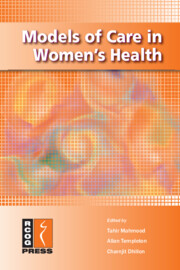Book contents
- Frontmatter
- Contents
- About the authors
- Abbreviations
- Preface
- CHAPTER 1 Setting the scene
- CHAPTER 2 Early pregnancy loss, including ectopic pregnancy and recurrent miscarriage
- CHAPTER 3 Infertility
- CHAPTER 4 Acute gynaecology
- CHAPTER 5 Sexual and reproductive health services
- CHAPTER 6 Termination of pregnancy
- CHAPTER 7 Heavy menstrual bleeding
- CHAPTER 8 Post-reproductive gynaecology
- CHAPTER 9 Urogynaecology
- CHAPTER 10 Vulval disease
- CHAPTER 11 Gynaecological oncology
- CHAPTER 12 Colposcopy services
- CHAPTER 13 Laparoscopic surgery
- CHAPTER 14 Gynaecological risk management
- CHAPTER 15 The role of the clinical director
- CHAPTER 16 Recommendations
- Index
CHAPTER 1 - Setting the scene
Published online by Cambridge University Press: 05 July 2014
- Frontmatter
- Contents
- About the authors
- Abbreviations
- Preface
- CHAPTER 1 Setting the scene
- CHAPTER 2 Early pregnancy loss, including ectopic pregnancy and recurrent miscarriage
- CHAPTER 3 Infertility
- CHAPTER 4 Acute gynaecology
- CHAPTER 5 Sexual and reproductive health services
- CHAPTER 6 Termination of pregnancy
- CHAPTER 7 Heavy menstrual bleeding
- CHAPTER 8 Post-reproductive gynaecology
- CHAPTER 9 Urogynaecology
- CHAPTER 10 Vulval disease
- CHAPTER 11 Gynaecological oncology
- CHAPTER 12 Colposcopy services
- CHAPTER 13 Laparoscopic surgery
- CHAPTER 14 Gynaecological risk management
- CHAPTER 15 The role of the clinical director
- CHAPTER 16 Recommendations
- Index
Summary
In recent years, there has been an unprecedented emphasis on the quality of clinical care. This has involved three main stakeholders, namely consumers, healthcare providers and commissioners, but increasingly the media has become a vocal partner as well. The perceptions of quality, however, vary among the different stakeholders. Consumers of health care expect an equitable, safe and effective service, available within easy reach. Patients' perception of quality depends largely on personal experience and the overall outcome of their contact with the clinical service. The media has also developed an important role as the patient's champion, by publicising adverse outcomes and poor patient experience, although the fact that the vast majority of patients have a satisfactory or positive outcome is not often emphasised. The Patient's Charter was published to set standards for overall patient care, in particular to provide clear rules for voicing concerns about clinical care, recommending that each unit should have a complaints procedure policy in place for dealing with patients' concerns. The Department of Health's document, A First Class Service, outlined a policy of ensuring ‘quality’ in the National Health Service, suggesting that standards would be set by the National Institute for Health and Clinical Excellence (NICE) and the National Service Framework, delivered via clinical governance, lifelong learning and professional regulation and monitored through the National Performance Framework and national surveys on patients and user experience.
Keywords
- Type
- Chapter
- Information
- Models of Care in Women's Health , pp. 1 - 5Publisher: Cambridge University PressPrint publication year: 2009

